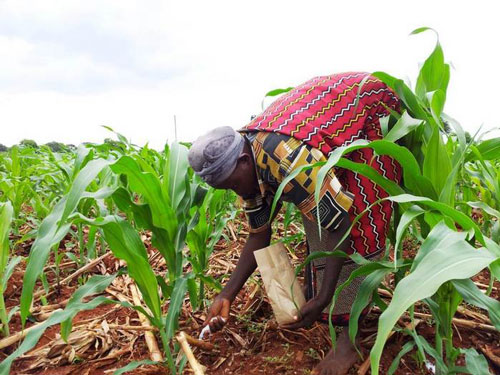WHEN FERTILIZER IS LIMITED, BREEDING SOLUTIONS FOR THE STAFF OF LIFE IN AFRICA

Among the major crops produced and consumed in sub-Saharan Africa (SSA), maize leads, consumed by more than 650 million Africans. Therefore, maize and Africa’s food security and socioeconomic stability are inseparably intertwined. Poor maize productivity has contributed to food shortages, high prices and has pushed more Africans to extreme poverty. Low-fertility soils are part of the problem, and maize varieties specially bred for poor soils offer a partial solution.
Maize and Soil—Chemical Solution, Socioeconomic Problem, Nitrogen in Sips Not Gulps
After water, poor soil nitrogen is the single most critical constraint for Africa’s maize production. Lack of, or inadequate, soil nitrogen leads to low yields and crop failure. Farmers therefore need nitrogen fertilizers to improve yields when soils are depleted or infertile. However, for most smallholder farmers, the harsh reality is that chemical fertilizers—or adequate amounts of them—remain out of their reach, unaffordable owing to the high costs.
To address this, the International Maize and Wheat Improvement Center (CIMMYT) and its partners are working through the Improved Maize for African Soils (IMAS) Project to develop maize varieties that are more efficient at using the small quantities of fertilizer that smallholder farmers can afford, typically less than 30 kilograms per hectare. This means that farmers obtain up to 50 percent more from the limited fertilizer applied.
From problems to solutions: everybody wins!
IMAS focuses on improving the genetics of maize varieties to better match the typical soil profiles of smallholder maize farms in eastern and southern Africa. Different maize varieties respond very differently to soil nitrogen stress. ‘In complement to improved agronomy and soil management, selection of appropriate maize varieties for specific soil conditions can play an enormous role in improving productivity and food security in Africa,’ observes Biswanath Das, a maize breeder at CIMMYT. By packaging nitrogen-use efficiency in the seed, IMAS hopes to improve maize yields efficiently and economically for small holder farmers in Africa.
At this year’s Global Soil Week (GSW) running from April 19–23 in Berlin, Germany, it is important that tangible solutions be formulated for farmers to nurture and sustain healthier soils. Engagement and dialogue forums like GSW and the recent #TalkSoil tweet chat initiated by the International Center for Tropical Agriculture and Shamba Shape Up (a Kenyan television show targeting smallholder farmers) are critical for inclusive discussions to help farmers in Africa.
Such dialogues must continue throughout 2015—the UN International Year of Soils—but also beyond. Why? Because soil is the staff of life, and the Substance of Transformation, as the Global Soil Week theme this year reminds us.
Links
- IMAS messages for Global Soil Week and International Year of Soils | Press release
- More on the IMAS project
- Videos: Maize for hungry soils | Maize that thrives in poor soils
- 2015 International Year of Soils | Global Soil Week
 Nutrition, health and food security
Nutrition, health and food security